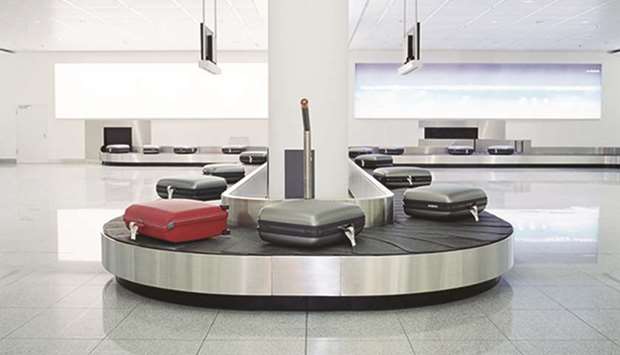Delayed, damaged and lost bags had cost airlines a whopping $2.3bn in compensation, transport and other imposts in 2017.
What apparently poses the greatest risk of bags being mishandled are journeys where luggage must be transferred from one aircraft to another, or from one carrier to another.
Other common causes for baggage mishandling worldwide are ticketing errors, bag switches, security issues, airport, customs, and weather or space-weight restrictions.
Two years ago, some 5.57 bags were reportedly mishandled for every 1,000 passengers, which, however, was a “record” low. That added up to 22.7mn bags globally, an earlier report from Swiss aviation technology group SITA showed.
Obviously, the last thing a passenger wants to see is his baggage failing to appear on the airport carousel or getting damaged during handling. Sceptics say there are no common worldwide rules obliging airlines to refund passengers for lost or damaged luggage.
That said, airlines are improving their “baggage management” practices, with the rate of mishandled bags falling by 70.5% over the last decade to a record low, as technology now allows for better tracking.
By 2020, more than 70% of the airlines, which are members of the International Air Transport Association (IATA), plan to provide “real-time bag tracking” information to passengers.
Globally, airlines handled in excess of 4.65bn bags last year, a number that is only expected to grow, given the rapid expansion of the industry and rise in the number of passengers.
Compared to 2015, the mishandling rate has been reduced by more than 40%, a recent IATA report showed.
Last year, IATA set in motion a project to improve baggage tracking under its ‘Resolution 753’, which lays emphasis on “digital transformation for baggage management”.
Under this, carriers will be equipped to track baggage at every stage of its journey, giving them full visibility to manage their baggage operations and more easily trace, retrieve and deliver missing or delayed bags.
This, industry analysts say, will eventually result in a better experience for passengers.
Over the next two years, services like real-time notifications and fast self-service bag drop will be more commonplace, a SITA executive points out.
By 2020, a “step change” in the passenger baggage experience will begin to appear, SITA noted. Travellers can expect to be offered more self-service options that may take the hassle out of managing their bags. They can arrive at the airport unburdened by their luggage and receive communication about what’s happening to their bags, real-time.
It is noteworthy that Qatar Airways is the world’s first airline to achieve compliance with the IATA Resolution 753 at its hub in Doha’s state-of-the-art Hamad International Airport (HIA).
The resolution requires the airline to track every piece of baggage from the start of the journey all the way through to its finish.
In April 2017 Qatar’s national carrier announced it had met the IATA mandate, a good one year in advance.
Resolution 753 was developed to reduce mishandling and baggage fraud, increase passenger satisfaction and enhance the overall baggage management landscape at airports around the world.
The resolution was issued in 2016 and made mandatory for all IATA airlines to comply by June 1, 2018.
The certification was achieved thanks to the national airline’s Baggage Management System (Haqiba) developed in-house, as well as its seamless real time integration with the Qatar Airways website and mobile app.
Qatar Airways offers real time updates on checked baggage through the “Track my bags” feature on its website and mobile app, providing passengers with a truly hassle-free baggage experience.
The mobile app provides real time notification to passengers with relevant updates on the bag, as well as the ability to retrieve the details on need basis using “My trips”.
The information includes various stages of the baggage handling process such as check-in, transfer, arrival, as well as reference to bag tags and baggage belt. This information guides passengers during the journey and provides insight into any instance of delayed or lost baggage.
The ‘Haqiba’ system enables Qatar Airways’ staff to proactively manage delayed bags to provide an optimised handling process.
As certain other airlines too are in the IATA Resolution 753 implementation stage, a rapid increase in those planning to provide bag tracking information to their passengers and staff is likely. At least seven out of 10 airlines expect to be providing these services by 2020.
Resolution 753 is also driving mobile services for mishandled baggage, with up to eight out of 10 airlines implementing, or planning to implement, missing bag reporting and missing bag communications.
Closely linked to baggage tracking, there is momentum building towards radio-frequency identification (RFID), which is an efficient technology that facilitates the Resolution 753 implementation.
RFID uses electromagnetic fields to automatically identify and track tags attached to objects. The tags contain electronically stored information.
It is true mishandled bags represent only a minority of the estimated 4.6bn or so bags handled each year. Nevertheless, they cost the industry an estimated $2.3bn (in 2017), which gives an indication of the business benefits that airlines can reap from their investments in-end-to-end bag tracking.
Looking at the longer term trend, passenger numbers have soared by 64% since 2007, IATA data show. In this period, the mishandling rate per thousand passengers got reduced by 70.5% and there has been a 46.2% cut in the annual cost of baggage mishandling to the industry.
Clearly, end-to-end baggage tracking shows the global airline industry’s commitment to enhancing passenger experience.
* Pratap John is Business Editor at Gulf Times.

Compared to 2015, the mishandling rate has been reduced by more than 40%, IATA said. Last year, IATA set in motion a project to improve baggage tracking under its ‘Resolution 753’, which lays emphasis on u201cdigital transformation for baggage managementu201d. PICTURE: IATA

